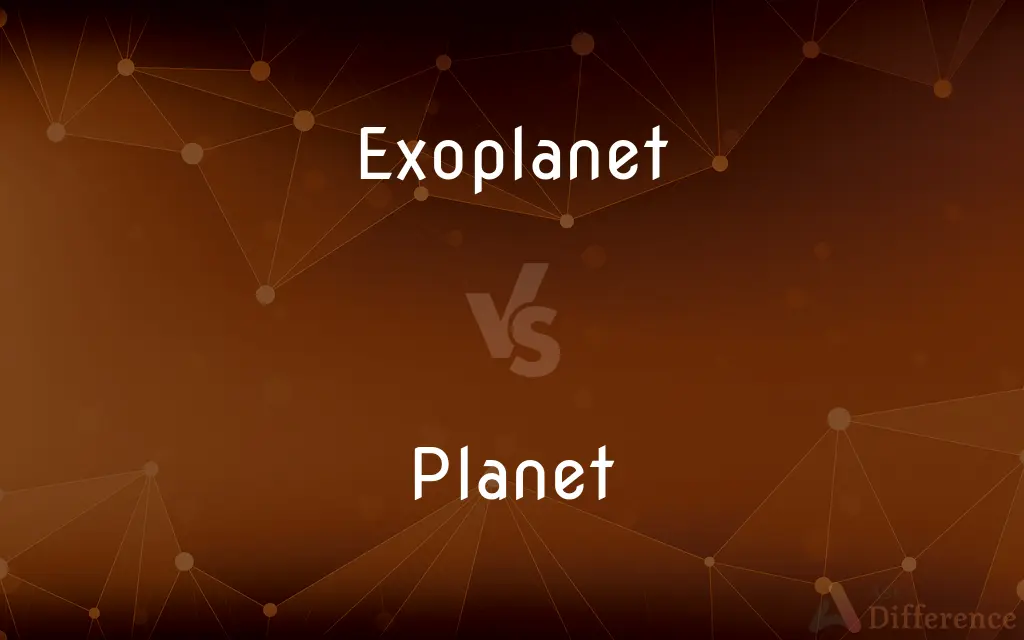Exoplanet vs. Planet — What's the Difference?

Difference Between Exoplanet and Planet
ADVERTISEMENT
Compare with Definitions
Exoplanet
An exoplanet or extrasolar planet is a planet outside the Solar System. The first possible evidence of an exoplanet was noted in 1917 but was not recognized as such.
Planet
A planet is an astronomical body orbiting a star or stellar remnant that is massive enough to be rounded by its own gravity, is not massive enough to cause thermonuclear fusion, and – according to the International Astronomical Union but not all planetary scientists – has cleared its neighbouring region of planetesimals.The term planet is ancient, with ties to history, astrology, science, mythology, and religion. Apart from Earth itself, five planets in the Solar System are often visible to the naked eye.
Exoplanet
An extrasolar planet.
Planet
A celestial body moving in an elliptical orbit round a star.
Exoplanet
A planet which exists outside Earth's solar system.
ADVERTISEMENT
Planet
In the traditional model of solar systems, a celestial body larger than an asteroid or comet, illuminated by light from a star, such as the sun, around which it revolves.
Planet
A celestial body that orbits the sun, has sufficient mass to assume nearly a round shape, clears out dust and debris from the neighborhood around its orbit, and is not a satellite of another planet.
Planet
One of the seven celestial bodies, Mercury, Venus, the moon, the sun, Mars, Jupiter, and Saturn, visible to the naked eye and thought by ancient astronomers to revolve in the heavens about a fixed Earth and among fixed stars.
Planet
The collection of life forms supported on Earth
An asteroid that threatened the whole planet.
Planet
People as a whole; humankind or the general public
The entire planet was affected by the global recession.
Planet
One of the seven revolving astrological celestial bodies that in conjunction with the stars are believed to influence human affairs and personalities.
Planet
Each of the seven major bodies which move relative to the fixed stars in the night sky—the Moon, Mercury, Venus, the Sun, Mars, Jupiter and Saturn.
Planet
(astronomy) A body which is massive enough to be in hydrostatic equilibrium (generally resulting in being an ellipsoid) but not enough to attain nuclear fusion and, in IAU usage, which directly orbits a star (or star cluster) and dominates the region of its orbit; specifically, in the case of the Solar system, the eight major bodies of Mercury, Venus, Earth, Mars, Jupiter, Saturn, Uranus, and Neptune.
Planet
Construed with|en|the or}} this}}: {{synonym of Earth.
Planet
A celestial body which revolves about the sun in an orbit of a moderate degree of eccentricity. It is distinguished from a comet by the absence of a coma, and by having a less eccentric orbit. See Solar system.
Planet
A star, as influencing the fate of a men.
There's some ill planet reigns.
Planet
Any of the celestial bodies (other than comets or satellites) that revolve around the sun in the solar system
Planet
A person who follows or serves another
Share Your Discovery

Previous Comparison
Literal vs. Typo
Next Comparison
Ambitious vs. Hardworking














































